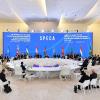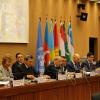SPECA Press Releases
Displaying Results 1 - 17 of 17
Meeting for the first time since the United Nations Special Programme for the Economies of Central Asia (SPECA) was created in 1998, the Heads of State and Government of SPECA participating States adopted the Baku Declaration. The declaration endorses a roadmap for the digitalization of multimodal
Gathering in Geneva on the margins of this week’s UNECE 70th Commission session, Ministers and high-level representatives of countries participating in the United Nations Special Programme for the Economies of Central Asia (SPECA) – Azerbaijan, Kazakhstan, Kyrgyzstan, Tajikistan, Turkmenistan and
Geneva and Moscow, 25 January - The economic growth in the Commonwealth of Independent States and Georgia will contract in 2023, albeit by a smaller margin than was previously expected, according to the United Nations World Economic Situation and Prospects (WESP) 2023
Representatives of Central Asian countries are in Kazakhstan this week to discuss how to work closely together to grow their economies, which have been buffeted by the continued COVID-19 pandemic and geopolitical crisis, in a sustained, greener manner while also taking advantage of advances in
SPECA countries have experienced the effects of climate change and the COVID-19 pandemic on key aspects of economic development and cooperation, with negative consequences for sustainable development. COVID-19 related restrictions and border closures caused serious disruption to supply chains and
Countries participating in the United Nations Special Programme for Economies of Central Asia (SPECA) have recognized the need for a more integrated approach towards structural economic transformation in order to build back better while staying on track to achieve the Sustainable Development Goals
Now is the moment to transform Central Asia from a periphery of the large trading blocs in Europe and East Asia into a bustling hub of development and trade at the heart of Eurasia. The Central Asian nations of Kazakhstan, Kyrgyzstan, Tajikistan, Turkmenistan and Uzbekistan, together with
Joint UNECE-UN ESCAP Press ReleaseMarking the 20th anniversary of the United Nations Special Programme for the Economies of Central Asia (SPECA), high-level participants from the seven landlocked participating countries - Azerbaijan, Afghanistan, Kazakhstan, Kyrgyzstan, Tajikistan,
SPECA countries agree to strengthen the programme and scale up work on innovation for achieving SDGs
The Governing Council of the United Nations Special Programme for the Economies of Central Asia (SPECA), on recommendations from the Economic Forum, held in Dushanbe on 5-6 December, agreed to elaborate a regional innovation strategy to support the achievement of the Sustainable Development
Central Asia faces numerous security, economic and environmental challenges in the new global situation. It becomes evident that all countries in the region need regional cooperation in order to face these challenges and secure sustainable development. This is why the participating countries in
The Economic Forum of the UN Special Programme for the Economies of Central Asia (SPECA) concluded that strengthened sub-regional cooperation is an important precondition for the achievement of several of the recently adopted Sustainable Development Goals (SDGs). The implementation report of the
Improving connectivity between Afghanistan and Central Asia was the focus of discussions at the 2014 Economic Forum of the United Nations Special Programme for the Economies of Central Asia (SPECA) held in Ashgabat on 4 December 2014 in the light of the Afghan chairmanship of SPECA during 2014
Центральная Азия сталкивается со все большими проблемами в области окружающей среды и водных ресурсов. Часть проблем - таких, как высыхания Аральского моря или небезопасных урановых хвостохранилищ - это унаследованны от прошлого. Увеличение загрязнения окружающей среды и нагрузки на водные
In response to the call by Rio+20 for the design of sustainable development goals that are consistent with the post 2015 development process, high-level representatives of countries participating in the United Nations Special Programme for the Economies of Central Asia (SPECA) met between 19 and
The 7th session of the Governing Council of the United Nations Special Programme for the Economies of Central Asia (SPECA) concluded on 28 November 2012 in Bangkok. The Governing Council, the top decision making body of the Programme, elected Kazakhstan as Chair country for one year. It takes
2012 SPECA Economic ForumGovernment leaders and researchers from Afghanistan, Azerbaijan, Kazakhstan, Kyrgyzstan, Tajikistan, and Turkmenistan, together with intergovernmental organizations and financial institutions working in Central Asia gather in Bangkok on 27 and 28 November for the 2012
GenevaThe 2010 Economic Forum of the United Nations Special Program for the Economies of Central Asia (SPECA) on 18 and 19 October in Geneva will discuss how strengthened regional cooperation in Central Asia can contribute to the long-term stability and sustainable development of Afghanistan






